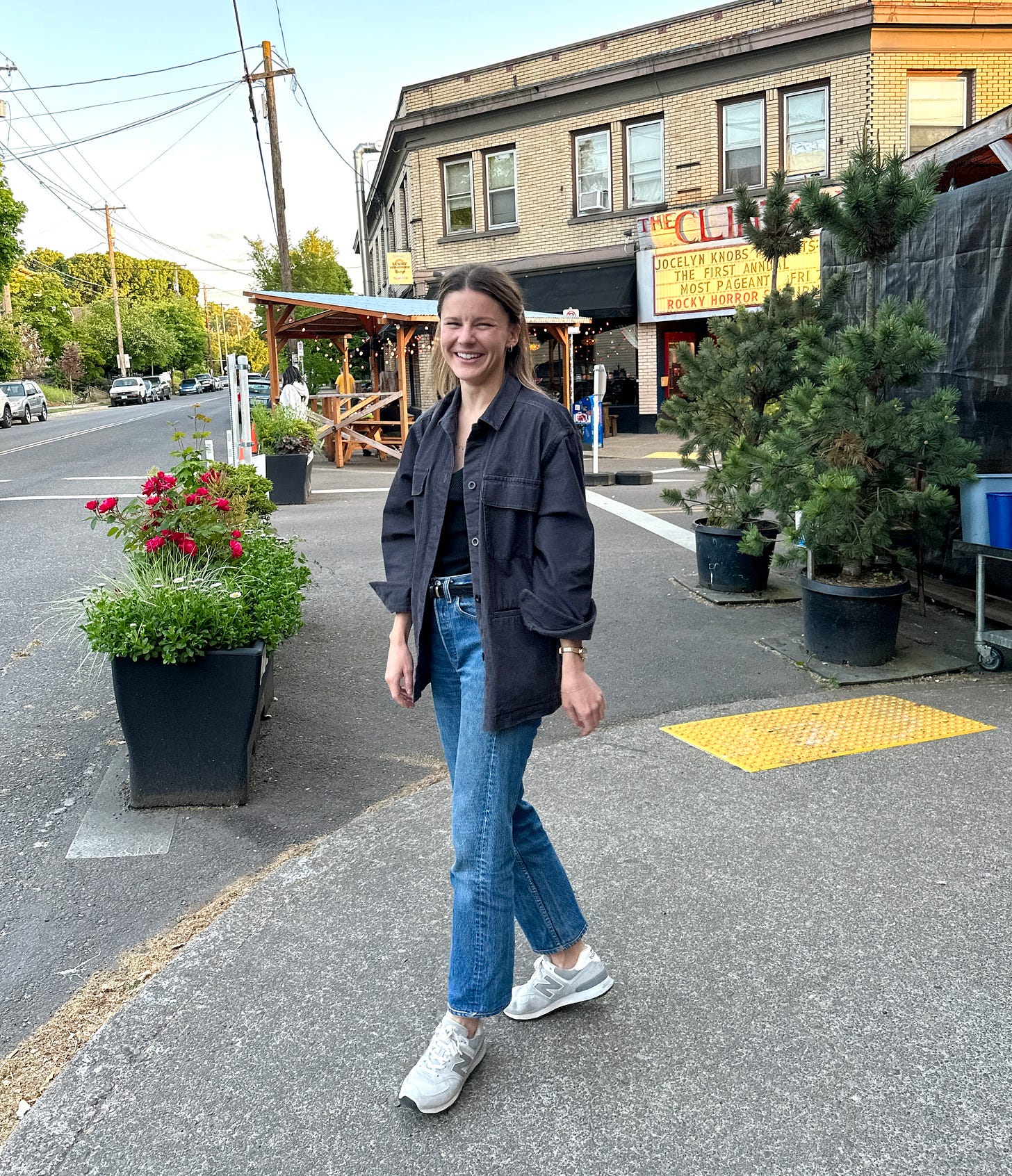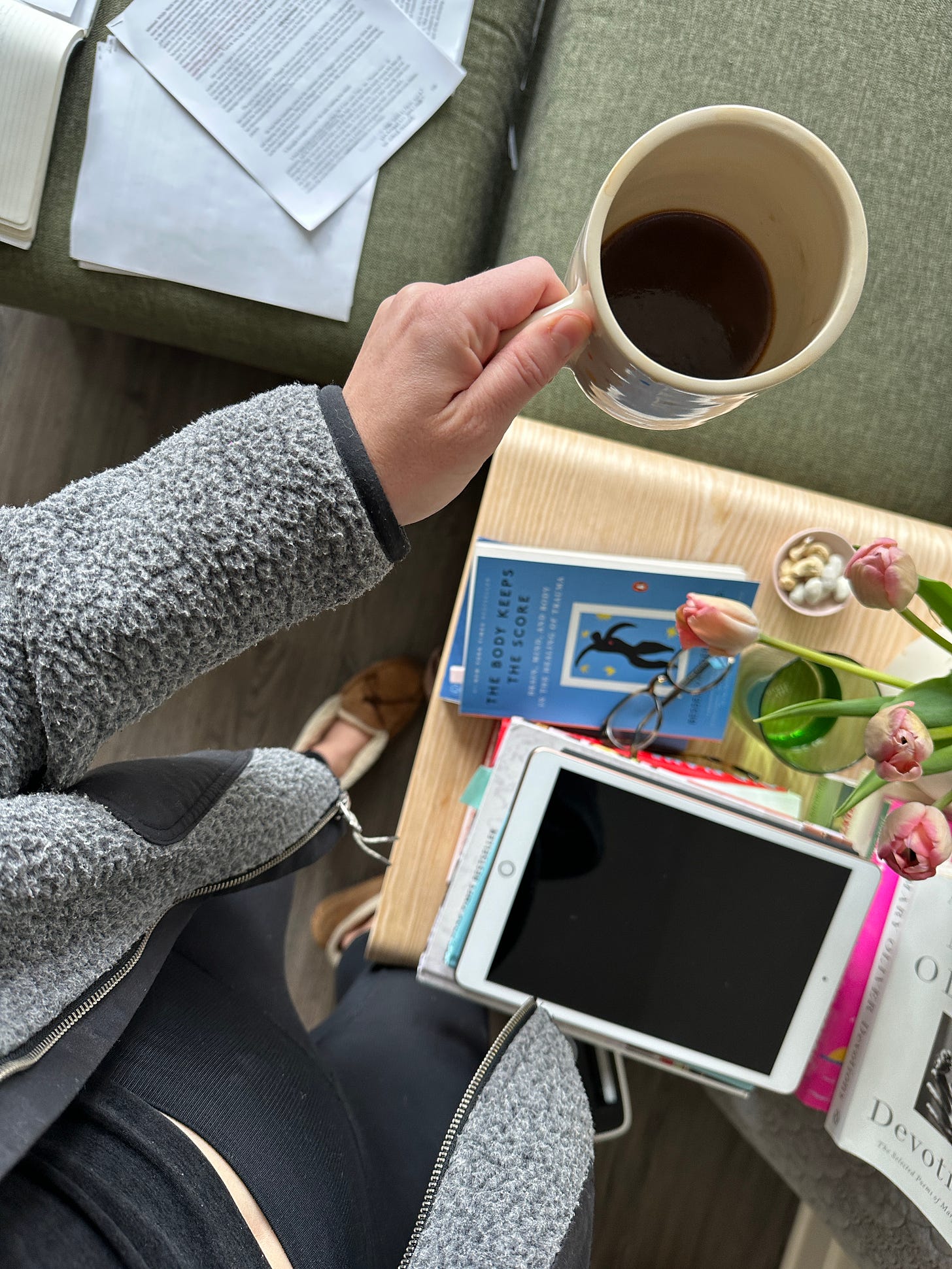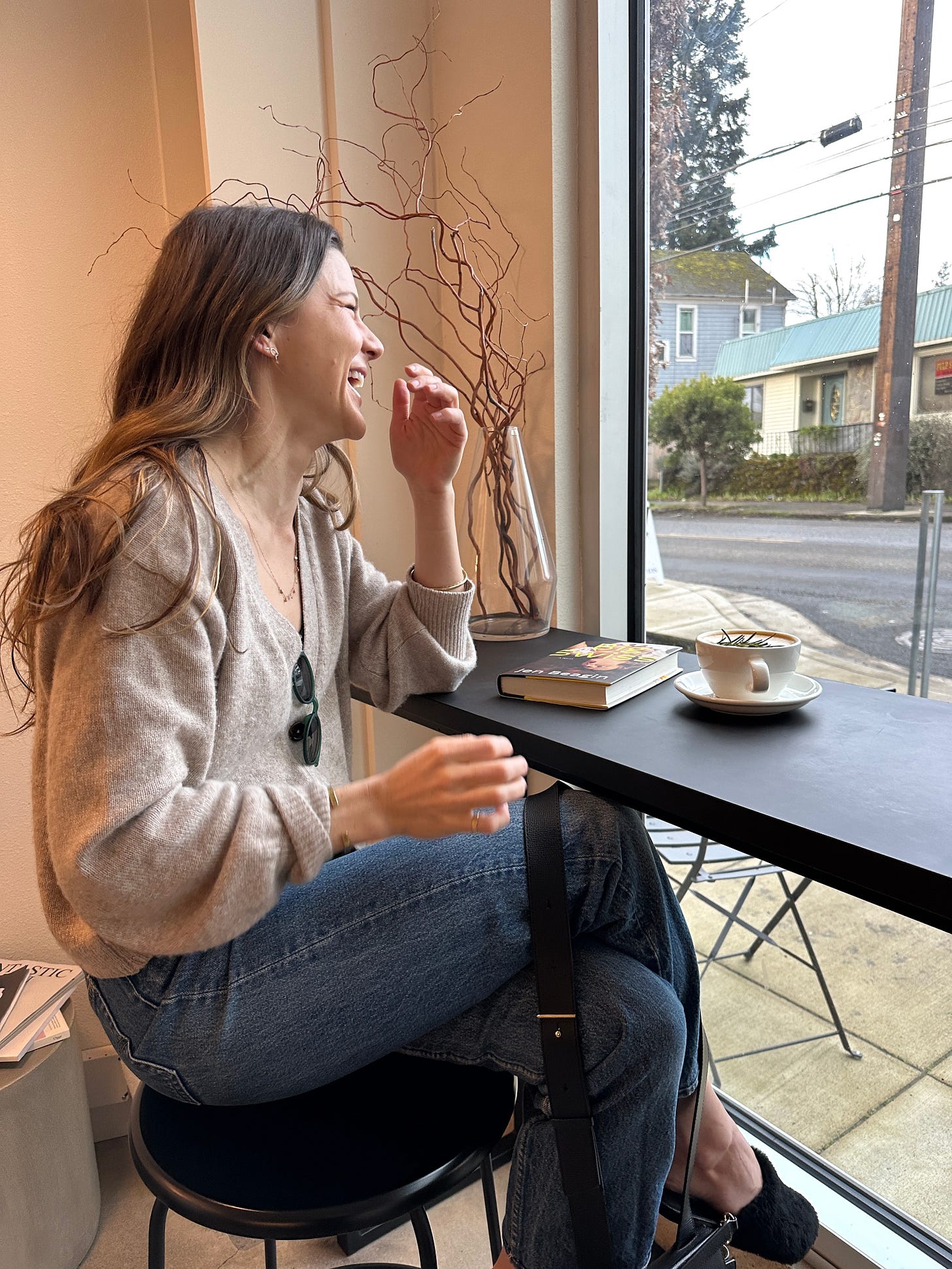Hej! I’m writing to you from Copenhagen, where I’m currently working from the Fully Booked Scandinavian bureau. Jk, I’m on vacation! I was in Stockholm for a few days before this, and, yes, both cities are as wonderful as you’d imagine—crisp, sparkling, green, lots of smoked fish and extremely stylish blonde women. I feel like the Swedish tourism board must have been working behind the scenes to really roll out the red carpet for us, because as soon as we stepped off the train from the airport, we immediately ran into Alexander Skarsgard. I already knew I had a great affinity for the Swedes based on my love of IKEA meatballs and the deep connection I forged with my Kirsten American Girl doll, but this really sealed the deal.
I’m v excited about today’s Q&A—it’s with the very cool and friendly Leslie Stephens, who lives in Portland and writes the great lifestyle newsletter Morning Person, which I highly recommend. She’s also a big reader (I love the book recs she includes in her Substack!), and her first novel is coming out next year. Meanwhile, she’s studying to earn her master’s in addictions counseling.
Here, Leslie and I chat about how she’s incorporated what she’s learned as a counselor into her writing, how her book tastes have changed throughout her life, and how reading memoirs have helped her throughout her separation from her partner:
⚡Lightning Round⚡
Currently reading: The Candy House by Jennifer Egan.
Favorite book of 2022: Tomorrow, Tomorrow, and Tomorrow and Women Who Run With the Wolves by Clarissa Pinkola Estés, which changed my life in many ways.
Book most excited for in 2023: Thao Thai's Banyan Moon, Ann Patchett's Tom Lake, and Jessica Knoll's Bright Young Women.
Desert island book: Mary Oliver's collection of poems, Devotions.
How much do you read in a week, and what are you typically reading?
I read about two to three novels a week, which are largely for my newsletter and for my own enjoyment. And then books for school, which are endless.
I really like book club lit and fiction. I gravitate toward books written by women—anything that's an honest story. I really love memoirs. Some of my favorite authors are Molly Prentiss, Sheila Heti, Dani Shapiro, Molly Wizenberg, and Jenny Odell, and my friend Thao Thai just came out with the book Banyan Moon—she’s so fabulous and I’d read anything that she writes. I just read a wonderful book by Jessie Gaynor called The Glow—it was her debut novel, and it was so great.
I can imagine that studying addictions counseling means you’re often learning about some very heady and heavy things. After a day of that, do you ever crave reading that’s light and easy?
Yes and no. Being in addictions counseling has made me so much less interested in small talk with people in the same way it's made me less interested in fluff novels. For example, I've been taking a class on trauma this semester, and while I wouldn't necessarily want to dive directly into a novel or a memoir specifically about trauma, I still want to read something really meaty about the human experience. It’s made me less interested in a fluffy romance story. I'm like, that's not really how it would happen, or I want to understand more about how she's thinking and feeling about this and conceptualizing this.
Along those lines, can you name a book where you felt the author did a really good job of unpacking human emotion?
I actually wrote a huge paper on Elizabeth Strout’s book Oh, William! It’s part of a loose trilogy about this character Lucy Barton. And one of the things that Elizabeth does so beautifully is really dive into the inner psyche of her characters—for instance, the way that Lucy deals with the grief around not having the mother she expected to have, her experience getting divorced, and then reigniting this relationship with her ex-husband. Strout did such a wonderful job of diving into the thought process of that character and what it would really be like to grapple with those things in a meaningful way.
As far as books that deal with self-reflection or self-growth, what are some titles you’ve personally really loved or that you’ve come across in your reading for school?
I feel like half of my bookshelf now is made up of all these thinkers who are really grappling with these big ideas. If you want to get really heady, there's a psychodynamic philosopher named Mari Ruti who writes some really wonderful books, including The Call of Character, that dive into what it is to be a human being. Karen Horney’s book Neurosis and Human Growth is really wonderful, too. I also love Deepak Chopra, Eckhart Tolle, Mark Epstein, Gabor Maté, and Clarissa Pinkola Estés.
Has studying counseling helped with your writing at all?
Oh, completely. So over the past year I was working with my editor to complete my novel, and one of the biggest edits was that I had all these characters who were doing things, but there wasn't a clear understanding why. Being able to dive into those characters from a counseling perspective helped me understand why I had written them the way that I had and helped me to clarify their motivations and who they are for the reader.
I started writing my book right before beginning my counseling program, and so I can almost see from draft to draft the ways in which I've grown as a counselor. My first draft was a lot of characters just doing things. And in the final draft of the book, there's really this deeper understanding of who these people are and why they would operate in these ways.
Have your reading tastes changed over the course of your life?
Completely. The biggest change is that I really appreciate memoir a lot more than I used to. About a year ago, I separated from my husband. I'm in my early 30s, so I was among the first of my friends to do this. I felt like I didn't really have a reference point for what I was doing or anybody to talk to who understood my experience, so I started turning to memoirs about divorce. It was incredibly powerful for me to read about these experiences and to see my own mirrored back to me through these other women who’ve gone through this.
For instance, Dani Shapiro—she wrote a really excellent memoir about marriage called Hourglass that's wonderful. I also loved Molly Wizenberg’s The Fixed Stars, Glennon Doyle’s Untamed, Maggie Smith’s You Could Make This Place Beautiful, and Deborah Levy’s The Cost of Living.
Another big change is that I’ve gotten into poetry, another genre that I just never touched before. I started reading Mary Oliver about a year ago when I went through my separation, and it opened the door to this entirely new genre for me. I also love Maggie Smith and Maggie Millner, and I’ve been reading The Unabridged Journals of Sylvia Plath—I love that you can pick it up and put it back down. I used to be very much about reading a novel from start to finish, but now I have these books that are literally all over my apartment and while I’m cooking dinner, I’ll pick one up and just read a poem and sort of chew on it for a little bit.
Before we go—tell me a little bit about your book that’s coming out next year.
I can't share too much at this point, but it’s speculative fiction. It's set 40 years in the future and it alternates between three perspectives—the founder of a wellness company, somebody who is engaging in this product, and then someone who works for the company. I'm really excited for it to be out in the world. We're working on the cover right now. It’s this very exciting time where it's finally starting to feel real.







